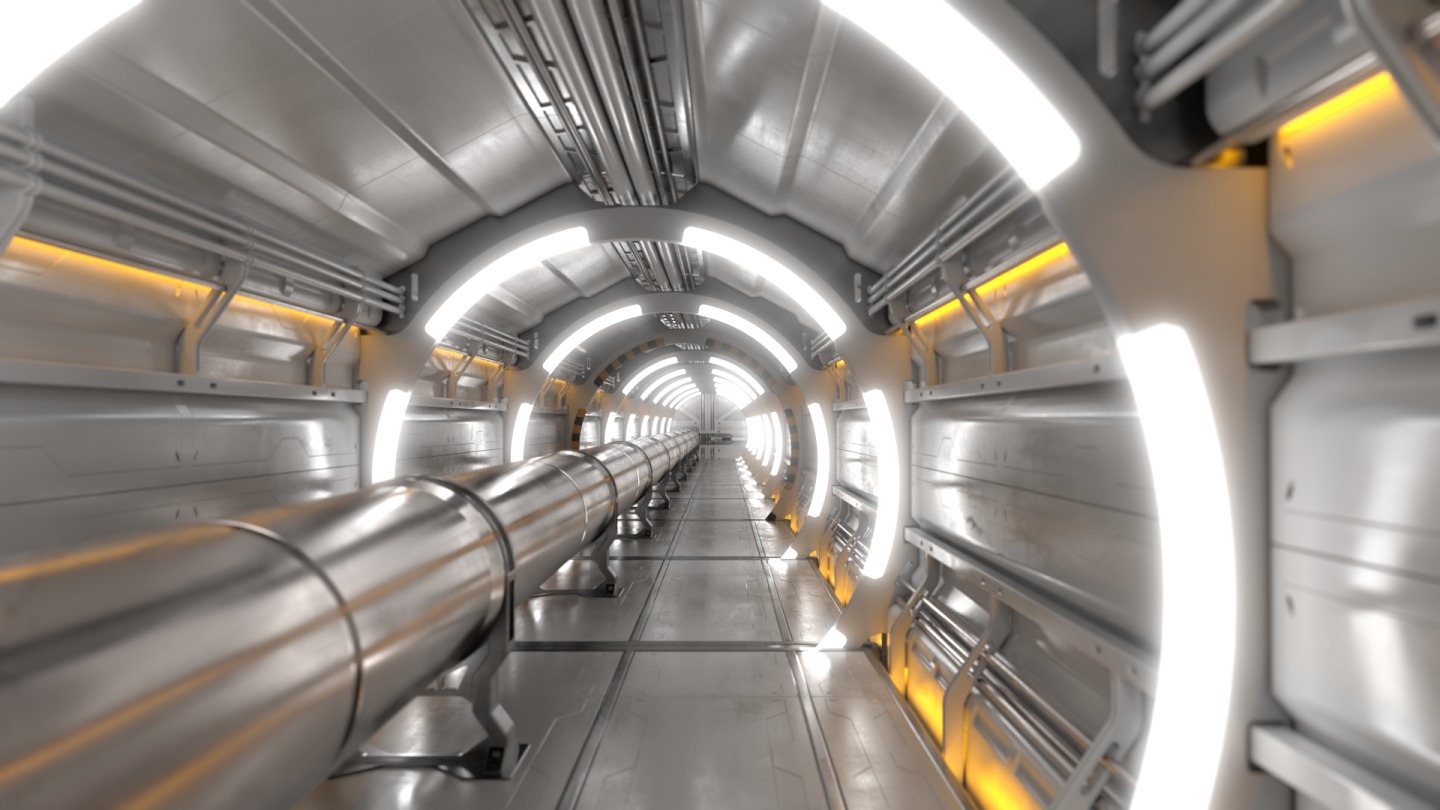The European Organization for Nuclear Research, more commonly known as CERN, recently published an ambitious proposal to build what could only be described as a mammoth accelerator that’s nearly four times as long and up to six times more powerful as its 27-km Large Hadron Collider (LHC), which studies the tiniest particles that make up all matter, dark matter, and infamously, black holes. The project is yet to be greenlit, but if a recent tweet from SpaceX and Tesla CEO Elon Musk is any indication, The Boring Company could play a part in the construction of the ambitious project.
In a tweet on Monday, Musk noted that the director of CERN had been quite interested in the tunneling technologies of The Boring Company, which could play a part in saving costs for the construction of the agency’s next-generation particle collider. Musk noted that by using The Boring Company’s tunnels, the project would likely save “several billion Euros.”
Director of CERN asked me about Boring Co building the new LHC tunnel when we were at the @royalsociety. Would probably save several billon Euros.
— Elon Musk (@elonmusk) January 21, 2019
The particle physics laboratory, which operates in a site near Geneva, Switzerland, outlined its plans for the 100-km LHC successor, dubbed as the “Future Circular Collider” (FCC), last Tuesday. The FCC is expected to replace the LHC, whose most notable success so far has been the discovery of the Higgs boson, a previously-theoretical particle that gives mass to all matter. Since the discovery of the Higgs boson in 2012, though, CERN’s Large Hadron Collider has not been able to discover any new particles of the same significance. This, according to Gian Francesco Giudice, CERN’s theory department head, highlights a need to push collider technologies forward.
“Today, exploring the highest possible energies with bold projects is our best hope to crack some of the mysteries of nature at the most fundamental level,” he said, according to Nature.
The possibilities that could be unlocked by a project as ambitious as the Future Circular Collider could easily come from a sci-fi tale. It would not be an exaggeration to state that the FCC would enable physicists to open the door to as-yet-unknown physics, while helping answer a number of notable questions about the universe. First off, the FCC would help CERN scientists study the Higgs boson more extensively — something that is not possible with the LHD. The project is also expected to allow scientists to explore topics such as dark matter and antimatter.
- The size of the FCC compared to the LHD. (Photo: CERN)
- An artist’s image depicting particles colliding. (Photo: CERN)
CERN’s Future Circular Collider is expected to be four times as large and up to six times more powerful than its predecessor. (Photos: CERN)
While the possibilities presented by CERN’s proposed 100-km particle collider are vast, the Future Circular Collider does have its fair share of drawbacks — the most notable of which is the cost of the entire project. CERN’s report on the FCC estimates that the project’s tunnels alone would cost €5 billion ($5.7 billion) to build. Another €4 billion ($4.6 billion) is expected to be required for the first collider (which will collide leptons), while €4 billion ($4.6 billion) would likely be needed for the final collider (which is designed to collide protons). Provided that the ambitious project does not meet any substantial difficulties in its construction, the FCC could be operational by 2040.
This is where The Boring Company’s technologies could come in. The tunneling startup, after all, aims to reduce the costs of tunneling through optimizations in the digging process. So far, The Boring Company is only involved in projects involving transportation, such as the construction of the high-profile downtown Chicago-O’Hare high-speed transport line. The cost savings presented by The Boring Company’s tunnels were particularly evident when Elon Musk revealed the cost of the startup’s mile-long test tunnel in Hawthorne, CA last December. During his presentation, Musk noted that the Hawthorne tunnel cost $10 million to construct. This is far more affordable than traditional tunneling costs, which cost most U.S. local and state governments an average of $200-$500 million dollars per mile.
Granted, the requirements for CERN’s 100-km tunnel would be far more than demanding than the otherwise straightforward tunnels that The Boring Company will construct in the immediate future. That said, the rather generous timeframe for the Future Circular Collider would also give The Boring Company some time to further refine and optimize its tunneling technologies. For now, though, the prospect of CERN’s next-generation LHD’s tunnels being dug by The Boring Company would remain an idea that would only get more plausible over time.
News
Tesla UK sales see 14% year-over-year rebound in June: SMMT data
The SMMT stated that Tesla sales grew 14% year-over-year to 7,719 units in June 2025.

Tesla’s sales in the United Kingdom rose in June, climbing 14% year-over-year to 7,719 units, as per data from the Society of Motor Manufacturers and Traders (SMMT). The spike in the company’s sales coincided with the first deliveries of the updated Model Y last month.
Model Y deliveries support Tesla’s UK recovery
Tesla’s June performance marked one of its strongest months in the UK so far this year, with new Model Y deliveries contributing significantly to the company’s momentum.
While the SMMT listed Tesla with 7,719 deliveries in June, independent data from New AutoMotive suggested that the electric vehicle maker registered 7,891 units during the month instead. However, year-to-date figures for Tesla remain 2% down compared to 2024, as per a report from Reuters.
While Tesla made a strong showing in June, rivals are also growing. Chinese automaker BYD saw UK sales rise nearly fourfold to 2,498 units, while Ford posted the highest EV growth among major automakers, with a more than fourfold increase in the first half of 2025.
Overall, the UK’s battery electric vehicle (BEV) demand surged 39% to to 47,354 units last month, helping push total new car sales in the UK to 191,316 units, up 6.7% from the same period in 2024.
EV adoption accelerates, but concerns linger
June marked the best month for UK car sales since 2019, though the SMMT cautioned that growth in the electric vehicle sector remains heavily dependent on discounting and support programs. Still, one in four new vehicle buyers in June chose a battery electric vehicle.
SMMT Chief Executive Mike Hawes noted that despite strong BEV demand, sales levels are still below regulatory targets. “Further growth in sales, and the sector will rely on increased and improved charging facilities to boost mainstream electric vehicle adoption,” Hawes stated.
Also taking effect this week was a new US-UK trade deal, which lowers tariffs on UK car exports to the United States from 27.5% to 10%. The agreement could benefit UK-based EV producers aiming to expand across the country.
News
Tesla Model 3 ranks as the safest new car in Europe for 2025, per Euro NCAP tests
Despite being on the market longer than many of its rivals, the Tesla Model 3 continues to set the bar for vehicle safety.

The Tesla Model 3 has been named the safest new car on sale in 2025, according to the latest results from the Euro NCAP. Among 20 newly tested vehicles, the Model 3 emerged at the top of the list, scoring an impressive 359 out of 400 possible points across all major safety categories.
Tesla Model 3’s safety systems
Despite being on the market longer than many of its rivals, the Tesla Model 3 continues to set the bar for vehicle safety. Under Euro NCAP’s stricter 2025 testing protocols, the electric sedan earned 90% for adult occupant protection, 93% for child occupant protection, 89% for pedestrian protection, and 87% for its Safety Assist systems.
The updated Model 3 received particular praise for its advanced driver assistance features, including Tesla’s autonomous emergency braking (AEB) system, which performed well across various test scenarios. Its Intelligent Speed Assistance and child presence detection system were cited as noteworthy features as well, as per a WhatCar report.
Other notable safety features include the Model 3’s pedestrian-friendly pop-up hood and robust crash protection for both front and side collisions. Euro NCAP also highlighted the Model 3’s ability to detect vulnerable road users during complex maneuvers, such as turning across oncoming traffic.
Euro NCAP’s Autopilot caution
While the Model 3’s safety scores were impressive across the board, Euro NCAP did raise concerns about driver expectations of Tesla’s Autopilot system. The organization warned that some owners may overestimate the system’s capabilities, potentially leading to misuse or inattention behind the wheel. Even so, the Model 3 remained the highest-scoring vehicle tested under Euro NCAP’s updated criteria this year.
The Euro NCAP’s concerns are also quite interesting because Tesla’s Full Self-Driving (FSD) Supervised, which is arguably the company’s most robust safety suite, is not allowed for public rollout in Europe yet. FSD Supervised would allow the Model 3 to navigate inner city streets with only minimal human supervision.
Other top scorers included the Volkswagen ID.7, Polestar 3, and Geely EX5, but none matched the Model 3’s total score or consistency across categories. A total of 14 out of 20 newly tested cars earned five stars, while several models, including the Kia EV3, MG ZS, and Renault 5, fell short of the top rating.
Elon Musk
Why Tesla’s Q3 could be one of its biggest quarters in history
Tesla could stand to benefit from the removal of the $7,500 EV tax credit at the end of Q3.

Tesla has gotten off to a slow start in 2025, as the first half of the year has not been one to remember from a delivery perspective.
However, Q3 could end up being one of the best the company has had in history, with the United States potentially being a major contributor to what might reverse a slow start to the year.
Earlier today, the United States’ House of Representatives officially passed President Trump’s “Big Beautiful Bill,” after it made its way through the Senate earlier this week. The bill will head to President Trump, as he looks to sign it before his July 4 deadline.
The Bill will effectively bring closure to the $7,500 EV tax credit, which will end on September 30, 2025. This means, over the next three months in the United States, those who are looking to buy an EV will have their last chance to take advantage of the credit. EVs will then be, for most people, $7,500 more expensive, in essence.
The tax credit is available to any single filer who makes under $150,000 per year, $225,000 a year to a head of household, and $300,000 to couples filing jointly.
Ending the tax credit was expected with the Trump administration, as his policies have leaned significantly toward reliance on fossil fuels, ending what he calls an “EV mandate.” He has used this phrase several times in disagreements with Tesla CEO Elon Musk.
Nevertheless, those who have been on the fence about buying a Tesla, or any EV, for that matter, will have some decisions to make in the next three months. While all companies will stand to benefit from this time crunch, Tesla could be the true winner because of its sheer volume.
If things are done correctly, meaning if Tesla can also offer incentives like 0% APR, special pricing on leasing or financing, or other advantages (like free Red, White, and Blue for a short period of time in celebration of Independence Day), it could see some real volume in sales this quarter.
You can now buy a Tesla in Red, White, and Blue for free until July 14 https://t.co/iAwhaRFOH0
— TESLARATI (@Teslarati) July 3, 2025
Tesla is just a shade under 721,000 deliveries for the year, so it’s on pace for roughly 1.4 million for 2025. This would be a decrease from the 1.8 million cars it delivered in each of the last two years. Traditionally, the second half of the year has produced Tesla’s strongest quarters. Its top three quarters in terms of deliveries are Q4 2024 with 495,570 vehicles, Q4 2023 with 484,507 vehicles, and Q3 2024 with 462,890 vehicles.
-

 Elon Musk4 days ago
Elon Musk4 days agoTesla investors will be shocked by Jim Cramer’s latest assessment
-

 News1 week ago
News1 week agoTesla Robotaxi’s biggest challenge seems to be this one thing
-

 Elon Musk2 weeks ago
Elon Musk2 weeks agoFirst Look at Tesla’s Robotaxi App: features, design, and more
-

 News2 weeks ago
News2 weeks agoSpaceX and Elon Musk share insights on Starship Ship 36’s RUD
-

 News2 weeks ago
News2 weeks agoWatch Tesla’s first driverless public Robotaxi rides in Texas
-

 News1 week ago
News1 week agoWatch the first true Tesla Robotaxi intervention by safety monitor
-

 News2 weeks ago
News2 weeks agoTesla has started rolling out initial round of Robotaxi invites
-

 Elon Musk2 weeks ago
Elon Musk2 weeks agoTesla to launch in India in July with vehicles already arriving: report




















